Planning a music business conference is a significant undertaking that requires careful attention to detail, a clear strategy, and an understanding of the current trends in the industry.
Effective event management is crucial in this context, as it involves budgeting, layout design, and sustainable practices to ensure a positive experience for attendees. An event manager plays a central role in this process, handling responsibilities such as vendor management, overall coordination, and ensuring all event aspects are executed smoothly.
Whether your goal is to offer networking opportunities, inspire creativity, share valuable insights, or facilitate collaboration within the music industry, creating a successful music business conference involves multiple layers of organization and careful execution.
In this comprehensive guide, we’ll walk through each essential element of planning a music business conference, covering everything from setting objectives and curating content to managing logistics and fostering a valuable attendee experience.
Understanding the Basics

What is Event Planning?
Event planning is the meticulous process of organizing and managing various types of events, including concerts, festivals, conferences, and weddings. It encompasses a series of steps, starting from the initial conceptualization to budgeting, planning, execution, and post-event analysis.
In the context of the music industry, event planning is crucial for ensuring the smooth operation and success of live music events. Whether you’re orchestrating a small concert or a large-scale music festival, effective event planning is the backbone that supports every aspect of the event, ensuring that all the details are meticulously managed and executed.
Also Read: How To Plan A Music Event From The Ground Up
Why is Event Planning Important?
Event planning is vital for creating a seamless and memorable experience for attendees. Proper planning helps meet the specific goals of an event, such as raising brand awareness, generating revenue, or celebrating a milestone.
Effective event planning includes developing contingency plans for potential issues, ensuring that any risks are managed effectively. By optimizing resources such as time, money, and manpower, careful planning leads to cost-effective and successful events.
For music events, this means ensuring that everything from the event venue to ticket sales is handled efficiently, contributing to a successful event that resonates with the target audience.
Setting Clear Objectives for Your Target Audience
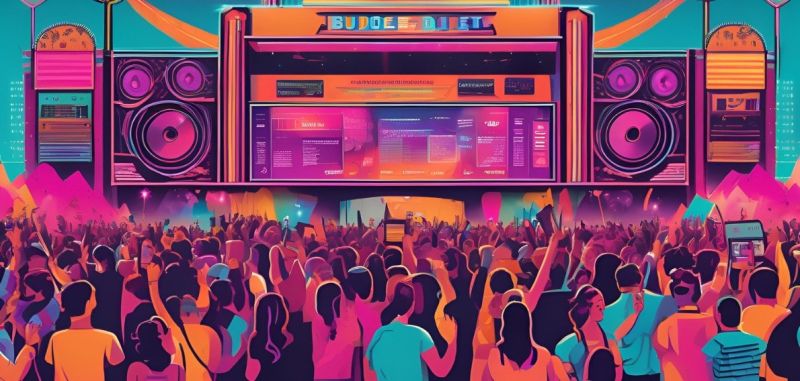
The first and perhaps most crucial step in planning a successful music business conference is to define clear and measurable objectives.
Selecting an appropriate event date is also significant, as it influences scheduling, audience attendance, and overall event success. What is the primary goal of your event? Whether you aim to educate, foster networking, showcase innovation, or provide a platform for collaboration, having a well-defined purpose will help shape every aspect of your conference.
Key Considerations for Setting Objectives:
- Target Audience: Identify the audience you aim to attract. Are you targeting independent artists, music executives, producers, or a blend of industry professionals? Understanding who you want to engage will help guide the content and format of your conference. For instance, if you’re planning a conference for emerging artists, your agenda should include panels on music production, branding, and digital marketing. On the other hand, if your target audience is music executives, focus on trends, investments, and the business side of music.
- Conference Theme: Develop a theme or central concept that aligns with your objectives. A strong theme adds cohesiveness to your conference program and allows your attendees to engage with content more meaningfully. Themes could focus on topics like “The Future of Music Distribution,” “Monetizing Your Music in a Digital World,” or “Empowering Independent Artists.”
- Outcomes: Think about the results you want to achieve post-event. Is it to create lasting partnerships, offer professional development opportunities, or generate brand exposure for your sponsors? Clarifying your desired outcomes will help you measure the success of your event and make improvements for future editions.
Also Read: How Event Organizers Should Prioritize Learning Detailed Audience Demographics
Curating Content and Programming

Once you’ve set clear objectives, it’s time to build a compelling program that resonates with your target audience. An event planner plays a crucial role in organizing and curating content and programming for the conference.
Content and programming are at the heart of any successful conference, and your conference should offer a mix of educational sessions, panels, keynotes, networking opportunities, and interactive workshops.
The goal is to provide value to your attendees by offering insightful content, real-world solutions, and the opportunity to engage with industry experts.
Key Elements of Curating Content:
- Panels and Discussions: Panels are a staple at most conferences and provide a platform for experts to share their knowledge. When selecting panelists, aim for diversity in both expertise and perspective. Invite music executives, artists, producers, marketers, and tech innovators. Be sure to provide topics that appeal to your audience’s interests, such as “The Impact of Streaming on Artist Revenue” or “Navigating Music Publishing and Licensing.”
- Workshops and Masterclasses: Workshops offer hands-on learning and in-depth engagement. You can curate specific topics, such as “Building a Personal Brand for Musicians” or “DIY Music Marketing Strategies.” These sessions should offer actionable takeaways that attendees can implement in their careers. Consider partnering with industry leaders to host masterclasses on specific areas of expertise, like live performance coaching, sound engineering, or social media management for musicians.
- Keynote Speakers: A captivating keynote address can set the tone for the conference and leave a lasting impact on attendees. Aim for a high-profile speaker who can draw attention to your event and offer valuable insights into the state of the music industry. Keynote speakers could include prominent music executives, successful artists, or thought leaders in emerging areas like music technology or data analytics.
- Networking and Roundtables: Make sure your programming allows for plenty of networking opportunities. Roundtable discussions, networking mixers, and speed-networking sessions are great ways for attendees to make meaningful connections. These formats can encourage collaboration and facilitate discussions around shared interests and challenges.
- Live Music and Performances: As a music business conference, it’s essential to incorporate live performances into the event. These performances not only provide entertainment but can also showcase emerging artists or industry talent. This can also serve as an opportunity for music industry professionals to scout talent or engage with the creative side of the industry.
Also Read: How To Create And Plan Stellar Content For Your Event
Interactive Formats:
To make the event more engaging and interactive, consider incorporating new formats, such as live polling, Q&A sessions, and real-time feedback. Attendees often appreciate events that allow them to contribute their thoughts and experiences.
In addition, virtual attendees might benefit from digital discussions or networking chats, which can be integrated into your event’s overall structure.
Choosing the Right Event Venue and Location
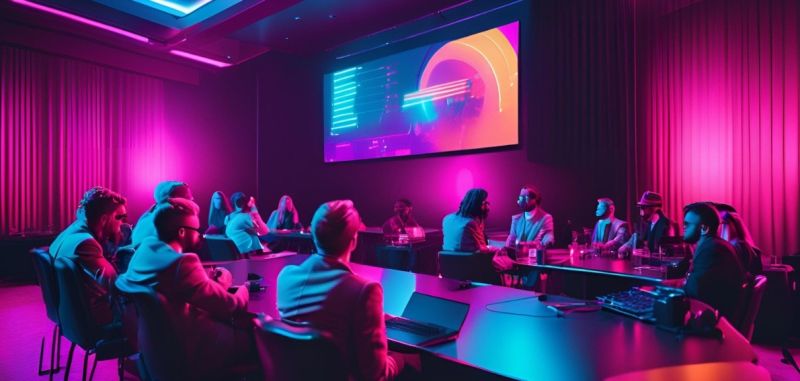
Selecting the right venue for your music business conference can make a significant difference in its success. Choosing the right concert venue based on the type of concert and the demographics of the audience is crucial.
The venue should accommodate your program, provide adequate facilities, and be conveniently located for both attendees and speakers. While the venue plays a critical logistical role, it also contributes to the overall experience of your event, from the ambiance to accessibility.
Factors to Consider When Choosing a Venue:
- Capacity and Layout: Your venue needs to have the right capacity to comfortably accommodate your expected number of attendees. Consider the types of sessions you’ll be hosting. Will you have large keynotes that require a theater-style seating arrangement or smaller breakouts that benefit from a more intimate classroom-style setting? Look for venues that offer flexible configurations so you can adapt the layout based on your programming.
- Acoustic Quality and AV Equipment: Given the nature of a music business conference, it’s essential that the venue has high-quality sound systems and AV equipment. Ensure that microphones, speakers, and projection systems are in place to accommodate various sessions, from panel discussions to presentations and live music performances.
- Accessibility and Location: Choose a location that’s easily accessible for your target audience. If you’re planning a local event, ensure that the venue is centrally located and well-connected by public transport. If your conference attracts international attendees, select a venue near airports or transportation hubs. Also, think about the surrounding area—attendees will appreciate a venue that is close to hotels, restaurants, and entertainment options.
- Amenities and Comfort: Ensure the venue provides necessary amenities such as Wi-Fi, comfortable seating, food and beverage options, and ample restroom facilities. Comfort is key to ensuring that your attendees remain focused and engaged throughout the event. Also, take into account space for networking, exhibitions, and social activities. These areas should be conducive to conversation and collaboration.
- Virtual and Hybrid Capabilities: If you’re planning a hybrid or virtual conference, ensure that the venue has the necessary infrastructure to support streaming. Consider the layout of the venue in terms of camera positions, internet bandwidth, and the ability to broadcast sessions seamlessly.
Planning and Budgeting
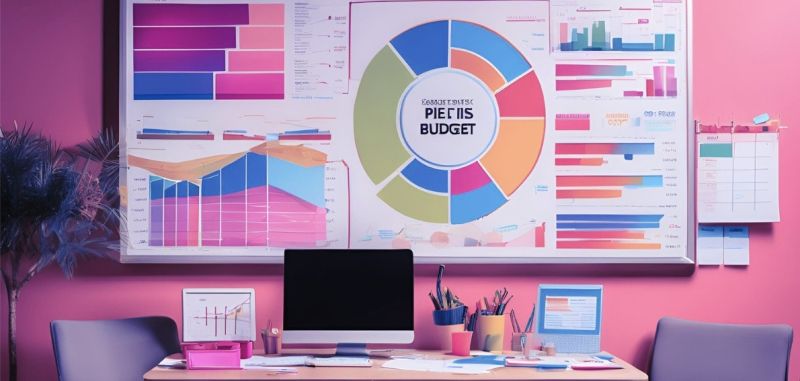
Create a Realistic Budget
Creating a realistic budget is a cornerstone of successful concert planning. A well-thought-out budget should encompass all potential expenses, ensuring that the event is financially sustainable and that all necessary costs are accounted for.
Also Read: Creating And Optimizing The Production Budget For Your Music Event
Start by researching and gathering quotes from vendors to get an accurate estimate of expenses. This includes everything from venue rental fees to talent fees, marketing, and technical production costs.
When creating a budget, consider the following:
- Venue Rental Fees: The cost of renting the event space, including any additional charges for setup and teardown.
- Talent Fees and Travel Expenses: Payments to performers, including travel and accommodation costs if necessary.
- Marketing and Advertising Expenses: Costs associated with promoting the event, such as social media ads, posters, and other promotional materials.
- Technical Production Costs: Expenses for sound and lighting equipment, stage setup, and other technical requirements.
- Staffing and Labor Costs: Payments for event staff, including security, ushers, and technical crew.
- Insurance and Liability Coverage: Ensuring the event is covered for any potential liabilities or unforeseen incidents.
- Contingency Funds: Setting aside funds for unexpected expenses that may arise during the event planning process.
By creating a realistic budget, event planners can ensure that their concert or music event is not only successful but also financially sustainable. This careful financial planning allows for a smoother event execution, ensuring that all aspects of the event are well-funded and managed effectively.
Also Read: 10 Hidden Costs to Budget for an Event
Securing Sponsorships and Partners

A key part of planning a successful music business conference is securing sponsorships and partnerships. An event planning business plays a crucial role in adopting sustainable practices and responsible marketing, which can attract eco-conscious sponsors and partners.
Sponsors are essential not only for providing financial support but also for adding value to your event through brand visibility and strategic collaborations. When seeking sponsors, it’s important to align with brands that share your values and resonate with your audience.
Strategies for Securing Sponsorships:
- Create Sponsorship Tiers: Develop a tiered sponsorship structure that offers various levels of exposure and engagement for different types of brands. A top-tier sponsor might receive prominent branding opportunities, exclusive rights to specific activities or sessions, and high-profile speaking opportunities. Mid-tier and lower-tier sponsors could be offered smaller activations, such as branded networking events or exhibition space.
- Align with Industry Partners: Consider partnering with industry-leading organizations, such as record labels, tech companies, music software platforms, and agencies. These partnerships can provide credibility and attract additional sponsors and attendees. It’s also helpful to build partnerships with educational institutions, music schools, or talent agencies that may have an interest in reaching a broader audience.
- Offer Creative Activation Opportunities: Sponsors are looking for ways to engage with attendees in creative and interactive ways. Offer them the opportunity to host workshops, set up branded booths, or sponsor specific sessions. Customizable activations, such as branded photo booths, live music showcases, or exclusive lounges, allow sponsors to engage with the audience in a more meaningful way.
- Track ROI: Sponsors want to know that they’re getting value for their investment. Be sure to include sponsorship benefits that are measurable, such as logo visibility, media exposure, social media mentions, or audience engagement. Tracking ROI through real-time data can help reinforce the value of sponsorships and improve future partnerships.
- Involve Media Partners: Collaborating with media partners, such as music magazines, websites, and podcasts, can significantly boost your event’s visibility. Media partners can promote your conference to a broader audience and even cover the event through interviews, live streaming, and feature stories. These collaborations can increase ticket sales and heighten brand recognition for your sponsors.
Marketing and Promotion for Ticket Sales

A successful music business conference doesn’t just happen; it requires effective marketing and promotional efforts to attract attendees, sponsors, and speakers. Gathering insights and feedback from prior events is crucial to enhance future events.
Developing a comprehensive marketing strategy that utilizes both digital and traditional channels is key to building buzz and driving attendance.
Steps for Effective Event Marketing:
- Build a Strong Online Presence: Your conference website should serve as the central hub for information. It should include event details, an agenda, speaker bios, ticket sales, and registration. Additionally, use your website as a place for blog posts, speaker announcements, and other updates. Regularly update the content and keep the information fresh to engage potential attendees.
- Leverage Social Media: Social media is a powerful tool for promoting your conference. Create event pages on platforms like Facebook and LinkedIn and use Instagram, Twitter, and TikTok to generate excitement. Share speaker announcements, behind-the-scenes footage, and countdowns to build anticipation. Engage with your audience by encouraging them to share their conference-related experiences and tag your event on social media.
- Email Campaigns: Build an email list to keep past attendees and potential registrants informed about the event. Send regular email updates about speakers, panel discussions, ticket promotions, and other conference-related news. Consider segmenting your email list to send targeted campaigns that resonate with specific attendee interests.
- Influencer Marketing: Collaborate with industry influencers, musicians, and thought leaders to amplify your conference’s reach. Influencers can share their thoughts on the event, promote ticket sales, or even appear as speakers themselves. This can help generate credibility and drive attendance.
- Press Coverage: Reach out to media outlets for press coverage, including local news outlets, music blogs, and industry publications. Sending press releases, inviting journalists to cover the event, and arranging interviews with key speakers or performers can significantly raise the profile of your conference.
Also Read: 5 Essential Pre-event Promotion Strategies To Engage Your Audience for a Successful Event
Logistics and On-the-Day Event Management
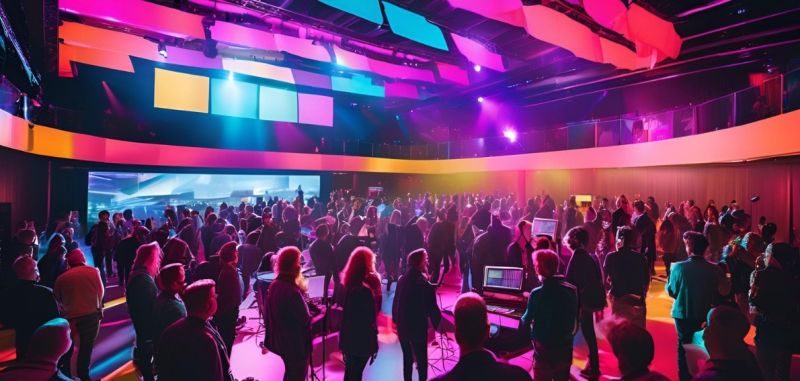
Finally, managing the day-to-day logistics and ensuring a seamless event experience for your attendees is critical. Thorough planning and organization in concert event management are essential to success.
Also Read: 5 Technological Innovations That Will Create A Better Experience At Your Event
From registration to crowd management, having a well-organized plan will keep everything running smoothly.
Key Logistics to Manage:
- Registration and Check-in: Set up an efficient and streamlined registration process, whether in-person or virtual. Offer early bird ticketing, and provide an easy-to-navigate registration platform for attendees to sign up. On the day of the event, ensure that there are enough staff to assist with check-ins and that the process is quick and seamless.
- Staffing and Volunteers: Having the right staff and volunteers in place is crucial for managing the event effectively. Assign roles to ensure all areas of the conference, such as sessions, registration, and networking events, are properly staffed. Brief your team on their responsibilities and provide them with necessary materials like schedules and attendee lists.
- Event Technology: Invest in the right technology to support the event, including event apps, live streaming platforms, and AV equipment. Be sure to test everything ahead of time to avoid technical issues during the event.
- Signage and Directions: Ensure your venue is clearly marked with signs directing attendees to different sessions, restrooms, lounges, and other facilities. Clear signage can greatly improve the attendee experience, especially in larger venues.
- Catering and Refreshments: Depending on the length of your conference, you’ll need to provide food and beverages for attendees. Work with catering services to ensure there are diverse options available, including vegetarian, vegan, and gluten-free choices. Create comfortable spaces for attendees to relax and network during breaks.
Planning a music business conference is a rewarding yet challenging endeavor. By focusing on setting clear objectives, curating engaging content, selecting the right venue, securing sponsorships, marketing effectively, and managing logistics, you can create an unforgettable event that provides value to your attendees and elevates your event’s profile in the industry.
With the right mix of planning, creativity, and execution, your music business conference can become a landmark event in the calendar, offering valuable insights and opportunities for everyone involved.
Also Read: Why Every Promoter Need To Keep Track Of Finances On The Day Of The Event
Frequently Asked Questions
What are the key steps in setting objectives for a music business conference?
Setting objectives is the first critical step in planning a music business conference. Begin by defining the primary goal of the event, such as networking, education, or showcasing innovation in the music industry. Understanding your target audience is key—whether you’re focusing on independent artists, industry professionals, or executives, tailoring your objectives to their needs ensures relevancy.
Additionally, establish clear outcomes for your event, such as forging partnerships or providing professional development. Defining the conference theme is also important as it creates cohesion in programming and engages attendees with a central concept. By setting clear, measurable objectives, you can evaluate the success of your event and make improvements for future editions, ensuring your conference delivers real value to participants.
How can I curate engaging content for my music business conference?
Curating content for a music business conference involves offering a balance of educational sessions, networking opportunities, and interactive experiences. Start with panels featuring industry experts who can share insights on pressing topics like the future of music distribution, licensing, or artist marketing. Incorporate workshops and masterclasses to provide hands-on learning in areas like brand building, production techniques, or social media strategies for musicians.
Keynote speakers should be carefully selected based on their ability to deliver impactful talks that align with your event’s objectives. Include networking sessions and roundtable discussions to allow attendees to engage directly with peers and experts. By combining diverse content formats and relevant topics, your conference will offer a rich experience that appeals to various audience interests.
What should I consider when choosing a venue for a music business conference?
Choosing the right venue for your music business conference is crucial for a smooth and successful event. Start by considering the capacity of the venue—ensure it can comfortably accommodate the number of attendees you expect, with flexibility for different session formats (keynotes, workshops, panels). Pay attention to the acoustics and technical infrastructure, as quality sound and AV equipment are essential, especially for live music performances or presentations.
Accessibility is another key factor; select a venue that is easy to reach by public transport and located near hotels or restaurants for the convenience of out-of-town attendees. Also, think about providing virtual or hybrid capabilities if you plan to host a broader audience beyond the physical location. Lastly, ensure the venue supports networking areas, catering, and attendee comfort throughout the event.
How can I secure sponsorships and partners for my music business conference?
Securing sponsorships and partners requires strategic planning and alignment with brands that share similar goals and target audiences. Begin by offering tiered sponsorship packages that provide varying levels of visibility and engagement. Higher-tier sponsors can receive more prominent branding, speaking opportunities, and exclusive rights to sessions or events. Mid-tier and lower-tier sponsors can engage through smaller activations like branded booths or networking events.
Look for industry-leading companies, such as record labels, tech firms, or music platforms, to enhance the credibility of your event. In addition, build partnerships with media outlets to increase visibility through press coverage and promotions. Offering creative and customizable activation opportunities for sponsors can increase engagement and provide them with valuable ROI. Tracking and reporting sponsorship performance through real-time data is essential to maintaining long-term relationships with sponsors.
What marketing strategies should I use to promote a music business conference?
Effective marketing strategies are vital to attracting attendees and sponsors to your music business conference. Start by creating a user-friendly website with event details, speaker information, agendas, and easy ticketing. Utilize social media platforms like Facebook, Instagram, LinkedIn, and Twitter to build excitement, share updates, and engage with your audience. Regular posts about speakers, panel discussions, and event highlights can create buzz.
Email campaigns are another powerful tool—keep your audience informed with targeted emails that include special offers, speaker announcements, and registration reminders. Collaborating with influencers or music industry personalities to promote the event can help extend your reach. Additionally, work with media partners for press coverage and feature stories to further boost visibility. By combining digital marketing, media outreach, and influencer support, you’ll be able to generate significant interest and drive ticket sales.
You May Also Like:
The Essentials Of Planning An Enticing Event Itinerary
Don’t Throw Your Music Event Without Checking This Ultimate Music Event Checklist


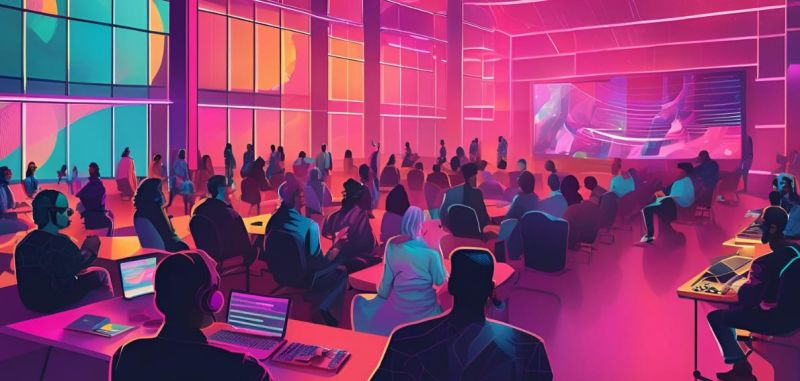
 6th June 2025
6th June 2025